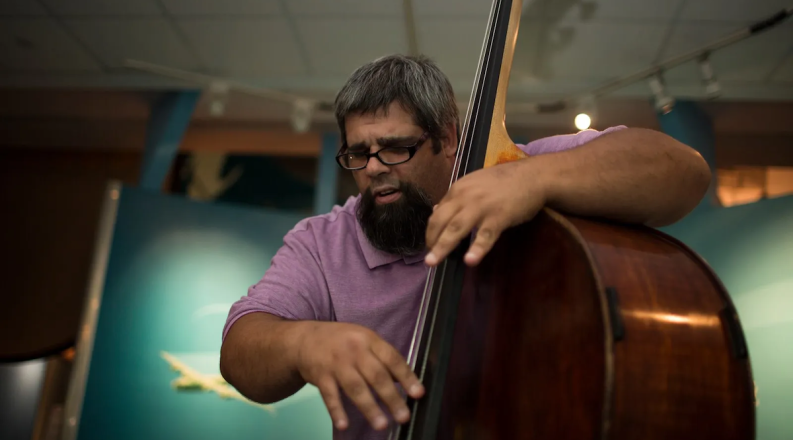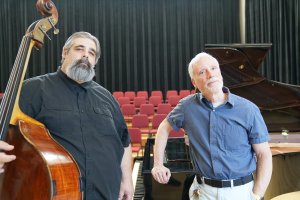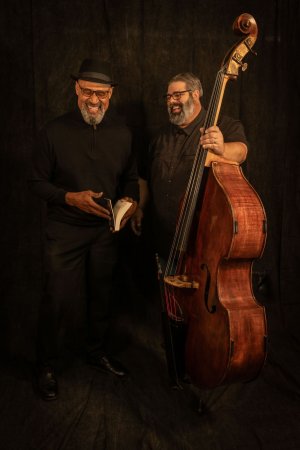When Chris Brydge arrived at Old Dominion University nearly 30 years ago, he wasn’t necessarily looking for the warm embrace of community or the guiding hand of patient mentors.
He was a cocky young bass player from a blue-collar background who needed a college degree, and Old Dominion was a school he could afford.
“I was a rock musician coming into a music school environment,” Brydge said. “I was used to playing in garage bands — Led Zeppelin or jam band type stuff. That was my mentality … And I was kind of a punk. Strong minded and definitely hardheaded.”
He adapted and excelled. Learning to play jazz and other styles at Old Dominion expanded his thinking and opened endless doors of opportunity. By the time he’d graduated with a degree in music education in 2000, he was a recognized presence on the Hampton Roads music scene, playing with the Virginia Symphony Jazz Orchestra as well as with national jazz acts and local stars.
Years later, after a descent into drug abuse nearly destroyed him, friends from ODU helped him reassemble pieces of his broken life.
Today, a drug-free Chris Brydge is hitting a creative peak.
His latest musical endeavor, released earlier this year, pairs him with retired Old Dominion English professor and poet Tim Seibles. The album, “Something Like We Did,” blends spoken poetry with deep acoustic bass grooves.
He’s also devoted to helping others fight addiction.
Brydge said Old Dominion has been a relentlessly positive influence.
“I don’t think I could put it into words,” he said. “I had an unbelievable experience at ODU. I wouldn’t be doing what I’m doing today if it wasn’t for this place.”
A turning point
Brydge is recognized in Hampton Roads as a prolific and adaptable musician — a go-to sideman who’s played with big name jazz performers John Abercrombie, Frank Foster and Steve Wilson as well as pop performers Debbie Boone, Shirley Jones and Bernadette Peters.
So, it was a shock to some in the local music community when, about a decade ago, Brydge was arrested on drug charges and sent to prison for three years.
Behind bars, he got clean and changed the course of his life. “I always tell people, I had to go to prison to get out of prison,” Brydge said.
These days, when he’s not on the bandstand, Brydge works as a peer recovery specialist at The Up Center, a community services organization headquartered in Norfolk.
“I’ve been in recovery for more than a decade,” Brydge said. “I’m now giving back what’s been given to me.”
No longer the cocky kid, he’s determined to be of service.
“Chris is just the epitome of a beautiful story of redemption,” said Richelle Burney, associate director of outpatient services at The Up Center. “You see it in how he’s lived his life. He’s so committed to giving back to others because of his life’s journey and some of the things he’s experienced.”
Keeping faith
ODU jazz professor John Toomey has offered Brydge guidance, support and friendship — in good times and in bad.
Toomey fondly recalls Brydge’s earliest days at ODU. “From the start, he was absolutely motivated,” Toomey said. “He moved ahead quickly, too.”
The young bass player’s focus was absolute.
“I remember him coming over to my house and standing on my front porch while I had my cigarette,” Toomey said. “I would say, ‘let me hear a chorus of blues.’ Or ‘let me hear you solo, really make the changes.’ He was always digging in on stuff like that. I put him on my regular gig down at Bienville Grill.”
After graduating from ODU, Brydge taught music at Tallwood High School in Virginia Beach for 13 years while still performing regularly.
His days with the public schools ended abruptly, however.
Brydge went to prison in 2014 after being convicted of felony drug charges for distribution and possession.
When the bassist hit bottom, Toomey remained loyal, writing Brydge letters and visiting him in prison.
Toomey’s support has been deep and meaningful, Brydge said. “It’s always been a positive impact,” he said. “I consider him a dear friend. He stuck by me through it all.”
Toomey always had faith that Brydge would bounce back.
“Chris immediately said, ‘What I’d really like to do is help people. Do counseling. Get a certificate so I can talk to people who are going through what I was going through.’
“To me, that was a very positive sign.”
Second act
Burney from The Up Center described Brydge as fiercely devoted to helping people free themselves from substance abuse.
A family-focused, community agency, The Up Center provides a host of services — from foster care and adoptions to credit counseling. The center is also a source of federally funded mental health and substance abuse counseling.
“Chris is very much genuine and honest and really comes from a place of wanting to see people be successful in their recovery,” said Burney, who hired him in 2021. “The other cool thing about him, he practices what he preaches. You can see that in the way he lives and conducts himself. When people are watching or not watching, he is who he is.”
Rumble and rhyme
Often, the role of the bass player is to support and collaborate. For Brydge, innovation is another natural groove.
As an undergraduate at Old Dominion back in the 1990s, he took an English class from poet Tim Seibles. Over the years, when the poet and the jazz musician crossed paths, they would chat about a possible collaboration.
Photo by Jennifer Natalie Fish/ ODU
Idle conversation evolved into an acclaimed art project.
On the recording “Something Like We Did,” released in April, Seibles reads his poetry while Brydge’s bass illuminates the words with darting melodies, slides and rhythmic stabs.
“I don’t like to use the ‘masterpiece’ too loosely, but this record is wholly deserving of the accolade,” wrote Tom Robotham for Veer Magazine. “I can’t think of a better way to drive home the idea that poems are meant to be heard, like music.”
Seibles is impressed by Brydge’s resilience.
“I think he's always been a person of depth, but not many people are able to rise above addiction and imprisonment to become a real help to others — and a fabulous artist,” Seibles wrote.
A typical day
Musically and personally, Brydge watches for a chance to extend a helping hand.
“I try to be here for people,” he said. “Just today, I sent a dude off to treatment, a homeless dude who I had met about a year and a half ago on the corner of Monticello and Granby. He was asking for some money. I told him, ‘I won’t give you money, but I’ll buy you something to eat if you’re hungry.’”
Brydge took him out for a burger and a milkshake and shared his own story. They stayed in contact. Eventually, the man was ready to make a change. He asked Brydge to be his peer recovery specialist.
That mental shift took time, but Brydge was patient. He understood.
“He’s hardheaded, too,” Brydge said. “We got him signed up and he left this morning. He’ll be in treatment for the next 25 days.
“I’ll be waiting for him when he comes out, if he wants to pursue this way of life,” Brydge said.
“That’s what I do now.”
Top photo: Bassist Chris Brydge is a mainstay of the Hampton Roads jazz scene. Credit: Photo by Tony Mata, courtesy of Chris Brydge





